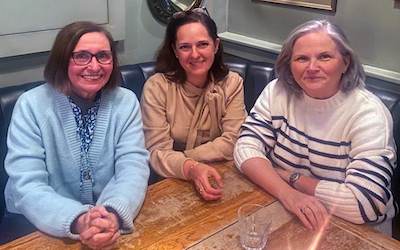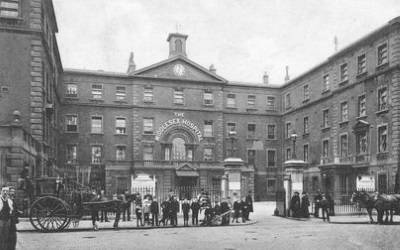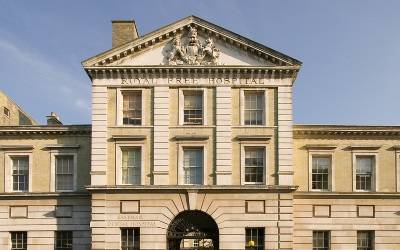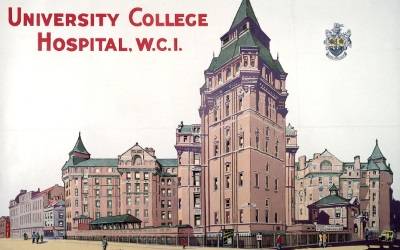UCL Medical School has emerged from the amalgamation of a number of prestigious institutions over a period of some years.
These are the medical schools of the Middlesex Hospital, University College Hospital and the Royal Free Hospital. These organisations combine a rich past in the history of science and medicine with advanced clinical practice.
- The Middlesex Hospital started training doctors in 1746
- The Royal Free Hospital was founded in 1828 by the surgeon William Marsden to provide free care to those of little means
- University College Hospital opened in 1834 and was the only one in London to be built to provide a university faculty with a hospital for teaching purposes
- The London School of Medicine for Women was established in 1874 and was the first medical school in the United Kingdom to train women as doctors.
In 1877 The Royal Free Hospital agreed to allow students from The London School of Medicine for Women to complete their clinical studies there and by 1896 was renamed The London Royal Free Hospital School of Medicine for Women
- The medical schools of the Middlesex Hospital and University College Hospital merged in 1987 to form the University College and Middlesex School of Medicine
- In 1998 The Royal Free & University College Medical School was formed from the merger of the two medical schools. On 1 October 2008, it was officially renamed UCL Medical School
Associated with UCL Medical School are several world-famous medical institutions which are now Institutes in the School of Life and Medical Sciences, including:
- the Institute of Child Health (Great Ormond Street),
- the Institute of Neurology (The National Hospital for Neurology and Neurosurgery),
- the Ear Institute (The Royal National Throat Nose and Ear Hospital)
- and the Institute of Ophthalmology (Moorfields Eye Hospital).
Staff from these Institutes design and deliver the MBBS programme together with colleagues from UCL Faculty of Life Sciences.
Notable alumni
Notable alumni of UCL Medical School and its predecessor institutions include:
- Josephine Barnes, championed the cause of women’s health throughout her illustrious career. First female president of the British Medical Association in 1979
- Diana Beck, first woman to be appointed to the honorary staff of the Middlesex Hospital, in 1947, and is thought to have been the first female neurosurgeon in the world
- Charles Bolton, appointed Commander of the British Empire (CBE)
- John Bowlby, pioneer of attachment theory
- Michael Brown, former Physician to the Queen
- Walter Carr
- Leslie Collier, virologist who helped to create the first heat stable smallpox vaccine key in the eventual eradication of the disease.
- Jane Dacre, recent president of the Royal College of Physicians (2014–incumbent), only the third female President in its nearly 500-year history
- Deborah Doniach, leading expert on auto-immune diseases
- Jeremy Farrar, director of the Wellcome Trust
- William Henry Flower, comparative anatomist and 2nd director of the Natural History Museum.
- Clare Gerada, former Chair of the Royal College of General Practitioners (2010–13), the first female Chair for 50 years
- Ben Goldacre, academic and science writer
- Anita Harding, neurologist who co-authored the first paper which identified pathogenic mitochondrial DNA mutation in human disease (in Kearn-Sayre syndrome).
- Gwen Hilton, A major figure in the campaign to allow women students to be admitted to the UCH Medical School in 1920, went on to establish the first radiotherapy department at University College Hospital
- Allan Octavian Hume, one of the founders of the Indian National Congress
- Donald Jeffries, leading expert on HIV
- Christian Jessen, television presenter
- Thomas Lewis, cardiologist who was appointed CBE and also knighted.
- Kalman Mann, 8th director general of Hadassah Medical Organization
- Arthur Martin-Leake, soldier who received both the Victoria Cross and the Bar.
- Clare Marx, recent president at the Royal College of Surgeons of England (2014-2017)
- Michael Mosley, television journalist and presenter
- Philip Randle, the Randle cycle is named after him
- Bernard Ribeiro, Baron Ribeiro, former President of the Royal College of Surgeons of England (2005–08). Life peer in House of Lords since 2010.
- Sydney Ringer, was a British clinician, physiologist and pharmacologist, best known for inventing Ringer's solution.
- William Scoresby Routledge, ethnographer
- Rosemary Rue,
- William Squire, gave the first anaesthetic in England in 1846
- Dawson Turner, rugby union international who represented England (1871–75).
- Margaret Turner-Warwick, first female president elected at the Royal College of Physicians (1989-1992)
- Albertine Louise Winner, first woman to win the University gold medal as a student, had a distinguished career as a physician and medical administrator
- R. A. Young
 Close
Close





